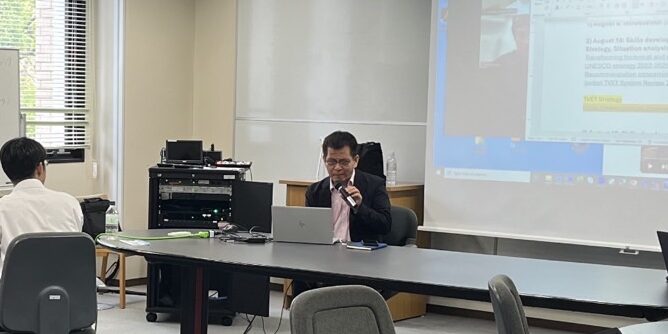Ogawa Seminar’s Welcome Party for New students
The welcome party of Ogawa Seminar took place in a BBQ restaurant near JR Rokkomichi Station November 2nd, 2016, and we celebrated two new research students who joined this fall...
Graduate School of International Cooperation Studies (GSICS), Kobe University


Dr. Hiromichi Katayama, a Programme Specialist at UNESCO Paris, recently delivered an intensive course from August 6, 2024, to August 23, 2024. The course focused on the development and evaluation of education systems, particularly Technical and Vocational Education and Training (TVET). Dr. Katayama is a key figure in the Section for Youth, Literacy, and Skills Development at UNESCO, where he works on enhancing national TVET systems, especially in low- and middle-income countries.
The course, titled “Educational Development Evaluation: Principles and Practice in Low- and Middle-Income Countries,” was delivered as an intensive course. It provided participants with an in-depth exploration of the challenges and strategies involved in TVET systems development. The curriculum covered a wide range of topics essential for understanding and improving TVET systems globally, with a specific focus on employment, economic, and social participation.
The course covered several key areas crucial to the goal of strengthening TVET systems. Some notable sessions included the following contents; (1) Skills Development and TVET Strategy: This session focused on situation analysis, policy review, and strategic planning and implementation within TVET systems; (2) Governance in TVET: Participants explored the governance structures needed for effective TVET system management, emphasizing a whole-of-government approach to skills development; (3) Project Formulation: This session used the “Better Education for Africa’s Rise” (BEAR) project as a case study to examine project formulation and execution within the TVET context; (4) Equity and Inclusion: Ensuring equity and inclusion within TVET was a critical component of the course and participants addressed gender divides and promoted access for all demographics; (5) Digital Transformation and TVET: This session focused on integrating digital technologies into TVET programs to keep them relevant and future-oriented given the increasing importance of digital skills.
Dr. Katayama’s course was not only theoretical but also highly practical. Participants engaged in active discussions presented a summary of the assigned topic, and ultimately produced a research or project proposal. This approach ensured that the knowledge gained could be applied in real-world contexts, particularly in the development of effective TVET policies and programs. His course was a crucial learning experience for individuals involved in or aspiring to work in the TVET sector. Through his extensive experience at UNESCO and a comprehensive curriculum, he provided participants with the tools and insights necessary to contribute to the strengthening of TVET systems worldwide. Besides, the course enhanced participants’ understanding of the challenges facing TVET and equipped them with practical skills to address these challenges in their professional endeavors. Finally, I would like to express my gratitude to Prof. Keiichi Ogawa for inviting Dr. Hiromichi Katayama to deliver this course and to Ryuto Minami (a teaching assistant for this course) for his effective facilitation of this course.
Authored by Million Bekele (Master’s Student)